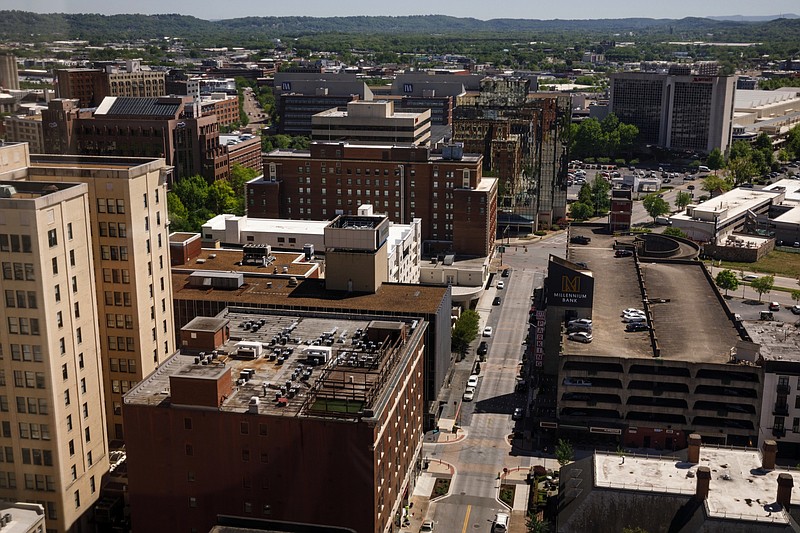Downtown Chattanooga's proposed Business Improvement District is a wolf in sheep's clothing.
Promising cleaner and safer streets - who wouldn't want that? - the business improvement district, or BID, seems more like urban seduction, promising gains without mentioning the damaging costs.
A BID is an undemocratic and morally questionable form of urban renewal. By creating a private board of unelected members - major commercial property owners, condo residents, hotel owners and so on - the BID effectively becomes a quasi-government, able to raise fees, or taxes, while shaping the downtown experience in its own image.
Property owners pay a fee to form a $1 million fund that provides a menu of enhanced services. The proposed ordinance gives a list:
"Maintenance and cleaning."
"Streetscape and landscape programs."
"Public safety."
"Security services."
"Acquire, construct, install and operate public improvements."
"Cultural enhancements."
"Aesthetic improvements."
And so on. The business improvement district would gain control - or City Hall would cede control - over streets, alleys, parks and waterways, all in an attempt to, as River City Co.'s Kim White said, put "the sparkle and shine back" in downtown.
Sparkle and shine? There are neighborhoods waiting for generations for just a moment of sparkle and shine. When do they get a turn? Why not redraw the BID zone to include the Westside?
Money doesn't freely flow into downtown the way it once did. The Friday-Saturday-night dollar is often shifting to other hot spots: Main Street, the North Shore and, soon, South Broad. We are cannibalizing ourselves, spreading ourselves too thin.
The proposed BID seeks to reverse attention back downtown. (the city council will hold public meetings this Tuesday before its evening vote.)
If the improvement district's stated goal is a 'sparkle-and-shine aesthetic,' then what instructions will a BID board give to its hired security guards concerning homeless folks?
Or groups of black teenagers with sagging pants?
Or protesters?
The BID's very existence is predicated on a cleanliness vs. ugliness binary. The BID thus defines what is clean and what is dirty.
The BID would effectively criminalize homelessness.
Here's what could plausibly happen:
» The downtown BID spawns others - the North Shore BID, the South Broad BID and so on. Soon, most of urban Chattanooga could be controlled by non-elected BID boards.
Downtown Chattanooga is already afflicted by a whitewashed ethos; too many African Americans have been ushered out in the name of remaking downtown. BIDs could essentially create an even more segregated Chattanooga, as BID board members - probably not black or brown folks - would gain added gate-keeping power.
"By removing the interests of small business owners as well as community members from the equation, property owners can remake a neighborhood as they see fit," writes Max Rivlin-Nadler in The New Republic's essay "Business Improvement Districts Ruin Neighborhoods."
Why is there no reserved seat on the BID board for low-income residents? Or small business owners? Or some defined quota to ensure diversity?
» Downtown businesses leave the BID zone. Frustrated by the fee-tax passed onto them, they relocate.
» Security guards become confrontational and aggressive with "undesirables"; the encounter is caught on cell-phone video. City Hall abdicates. Who is held responsible?
» Downtown protest is muted. In other cities, BID boards have gained control over sidewalks, which means hired security then has discretion over who stands, sits, marches or sleeps on sidewalks.
Why is a BID even necessary?
If trash is indeed a problem - and I'm not certain it is - then why isn't River City protesting City Hall for dereliction of duties? City government already provides the services a BID seeks. It sweeps streets. Cleans up trash. Polices and enforces.
Why would downtowners pay twice for services?
What is the larger motive here?
View other columns by David Cook
"If the BID model continues to proliferate, the commons that make a city great could be completely at the disposal of a single class, one that's inherently opposed to discourse and organizing," writes Rivlin-Nadler.
How many First Amendment champions are for this?
How many small business owners?
How many black and brown Chattanoogans?
Downtown Chattanooga is not Disneyland.
David Cook writes a Sunday column and can be reached at dcook@timesfreepress.com.

